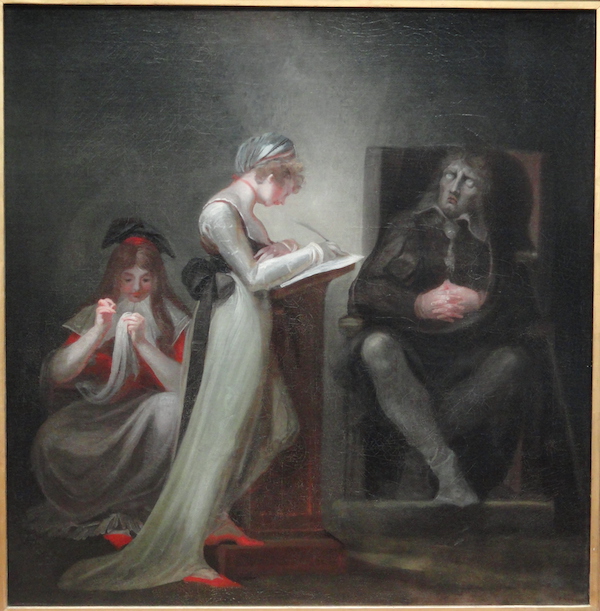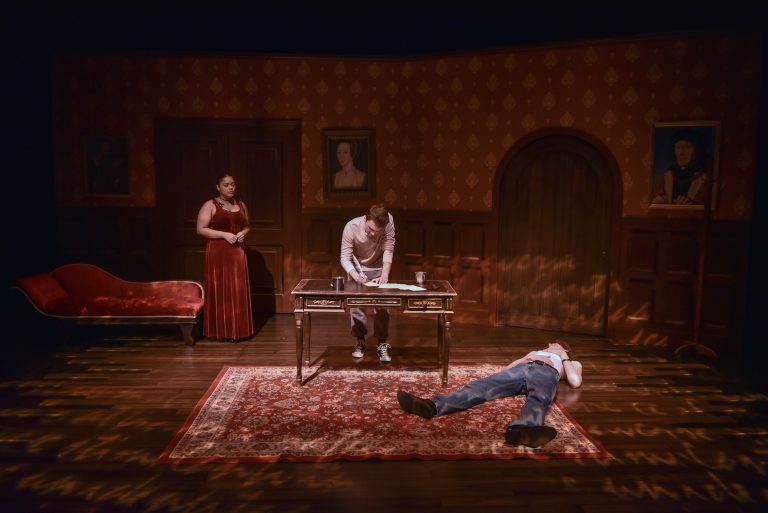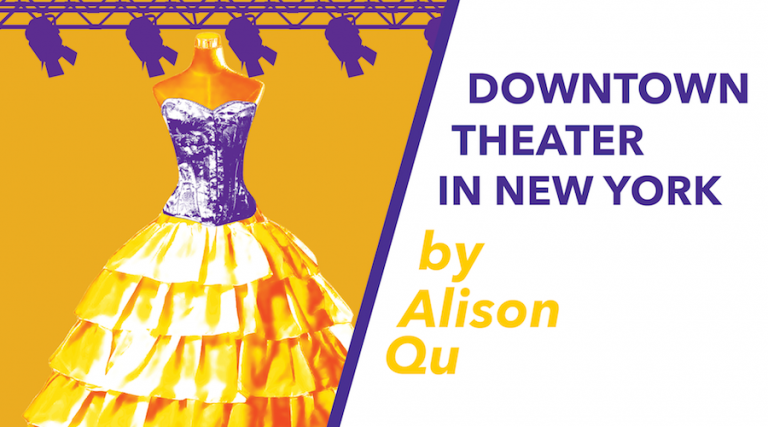Q&A: Stupid F##cking Bird Assistant Director Jenna Glazier
Jenna Glazier is the Assistant Director for Stupid F##king Bird and a BFA Theatre senior in the Department of Performing Arts. Her Emerson Stage credits include Measure for Measure (Dramaturg) and Love and Information (Assistant Company Manager). Emerson credits include Songs for a New World (Co-Director), I Never Saw Another Butterfly (Director), and Children of Eden (Director). Jenna will be directing Helen for the Emerson Shakespeare Society in November of this year.
Jenna took some time to sit down for an interview and answer a few questions for our blog about her work with our first production of the 2019–2020 Season. Watch the video with rehearsal footage and/or read the blog here:
 What was the process like for developing the vision for this production?
What was the process like for developing the vision for this production?
By the time I came on board as the assistant director, Rebecca had spent months cultivating the vision for this production. Once rehearsals kicked off, however, Rebecca and I focused a lot on creating a playground for the characters rather than a specific, developed location. This involved a lot of free-thinking, with the goal of making space for the actors at the forefront of our minds. I think the idea of space, what you can do in it, and all of the different things it can turn into was a throughline in the development of this production.
What was it like to work with Rebecca on this show?
Working with Rebecca was such a wonderful experience. Something both the cast and I appreciated was how close Rebecca is in age to us in comparison to other directors we’ve worked with. She’s incredibly approachable and does not shy away from praise—though you still have to earn it, to be sure. These characteristics, I feel, are scarce among older, more traditional directors. Rebecca’s tablework process was eye opening for me as an aspiring director, and the environment she creates in the rehearsal room is something to be admired. As Rebecca’s assistant, I always felt that I had a voice in the room, both for sharing ideas and asking questions—which I think speaks volumes to Rebecca’s style and skill as a leader.
What has been your role in the process?
My role has been pretty fluid. In some moments, I’m Rebecca’s sounding board for her visions for different scenes and any ideas that come up in the room. In others, I’m spending time with actors who are waiting for their next scene and discussing their characters with them. Overall, though, I think my most prevalent role in this process has been to help Rebecca really carve out her vision for this show. Not that she is a director who would ever come into a room with only half an idea, but I loved the times in rehearsals where I was able to help bring even a little bit more out of the layers in a scene or a moment.
What do you love most about this show?
Stupid F##king Bird is one of the most honest plays about love I have ever read. It makes sense, considering Chekhov was the master of discovering the truth buried beneath the mundanity of everyday life. The love of all different kinds in this play is so moving and inspiring; I take something new away after every rehearsal. The text and the characters of this play radiate love throughout all three acts. Even though you sometimes have to look for it, the love is always there. As Kyle Goold so beautifully delivers as Sorn, “there is so much love in this house…. Or what passes as love.’’ This play brilliantly exposes all the different forms of love; and it sure doesn’t shy away from the ugly parts.
Is there a theme that you’re hoping audiences extract from the show? If so, what is it?
I hope people can see the deep, constant relevance of this show. What makes Chekhov’s works so unique is the timelessness and nuanced human qualities of his characters. He added layers upon layers to the foundation left by Shakespeare. In Stupid F##king Bird, Aaron Posner enhances these Chekhov-ian characteristics and masterfully blends them with modern language and allusions to the topics and buzzwords that fill the minds of people today. This isn’t some old play by a dead guy turned new—it’s a play that hits the refresh button on one of the most iconic plays in Chekhov’s repertoire.
What was the most difficult aspect of preparing this production?
We’ve been really lucky while working on this production. Everyone seems to get it. Our cast took to their characters like a bird to the air which made directing this show a million times easier than it could have been. I think the most difficult part has been the actual context of the piece, which can sometimes get very dark and hard to unpack. Being able to tap out at the end of rehearsal and not take this story home with you was a challenge, but we focused on finding effective ways of decompressing and supporting each other throughout the process.
Do you have a dream show that you would love to direct?
This is such a hard question! I would like to think that my dream show hasn’t even been written yet and I will be able to be a part of that collaboration with the playwright. But if I had to choose something that already exists in the canon, I think it would have to be Disney’sThe Hunchback of Notre Dame or Bad Jews by Joshua Harmon—I know, they’re super similar, right?! I think both of those shows are so beautiful and wonderful in different ways and I would love to help bring them to life.
See Stupid F##king Bird September 26 through 29 in the Jackie Liebergott Black Box Theater. Tickets ($12 general public | $8 emerson community) at emersontheatres.org.




